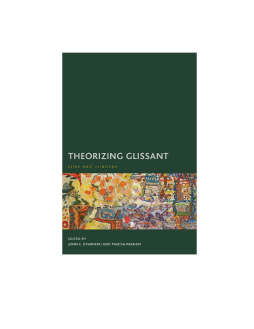
Additional Information
Book Details
Abstract
Édouard Glissant’s work has begun to make a significant impact on francophone studies and some corners of postcolonial theory. His literary works and criticism are increasingly central to the study of Caribbean literature and cultural studies. This collection focuses on the particularly philosophical register of Glissant’s thought.
Each of the authors in this collection takes up a different aspect of Glissant’s work and extends it in different directions. twentieth-century French philosophy (Bergson, Badiou, Meillassoux), the cannon of Caribbean literature, North American literature and cultural theory, and contemporary cultural politics in Glissant’s home country of Martinique all receive close, critical treatment. What emerges from this collection is a vision of Glissant as a deeply philosophical thinker, whose philosophical character draws from the deep resources of Caribbean memory and history. Glissant’s central notions of rhizome, chaos, opacity, and creolization are given a deeper and wider appreciation through accounts of those resources in detailed conceptual studies.
Theorizing Glissant highlights the philosophical anchor of Glissant’s work. The collection comprises essays on Glissant’s key concepts; essays that link his work to contemporary philosophical notions; and essays focusing on specific works. In the first category is a discussion of Glissant’s notion of opacité and the urge to reconceptualize identity as dictated by performance through resistance, discontinuities, and adaptations. In the second, Glissant’s work is methodically highlighted as linked to prominent philosophical ideas: Bergson’s duration; Deleuze and Guattari’s difference, being, and becoming; Luce Irigaray’s sexual difference and creolization with ‘the trace of sexual difference … marked in two absences.’ Among the essays on specific works is a reading of The Ripening through Husserl’s phenomenological principles leading to the implementation of conceived ideas, or contre-action aggissante. Identity has to be sought in the hic and nunc without disregard to all its negotiated, sedimentary elements. This allows him to be critical of Césaire and the negritude tenets of return. In sum, this important critique situates Glissant’s work within the framework of the ongoing modern debate on identity, the influx of various cultural trends, and creolization. Summing Up: Recommended. Upper-division undergraduates and above.
Theorizing Glissant: Sites and Citations makes an important contribution to the field of Caribbean studies through a nuanced and diverse examination of the keywords that lie at the core of Édouard Glissant’s vast oeuvre. The book reads as a sort of guide through the central tropes, poetic aims, political contexts, and philosophical questions that motivate the Martinican’s thought.... [T]his book should be of interest not only for Caribbean scholars but also for those involved in philosophy, critical theory, literature, and cultural studies, as well as scholars engaged with racial and ethnic matters.
Edouard Glissant's apparently inexhaustible legacy for postcolonial poetics - and indeed for postcolonial thinking in general - is very well served by this volume. Not only does the book offer original, eye-opening angles of approach to the work and influence of a crucial author, but readers, specialists and non-specialists alike, will particularly appreciate the freshness, tautness and edginess of the comparative or relational essays.
Mary Gallagher, Professor of French and Francophone Studies, University College Dublin
Theorizing Glissant is the first book in English to consider Édouard Glissant not only as major postcolonial theorist, but also as a philosopher in the full sense of the term. This outstanding collection is a must read for scholars interested in Caribbean thought and also for philosophers eager to understand how Glissant makes us rethink epistemology, ontology, aesthetics, ethics, and political philosophy anew.
Valérie Loichot, Professor of French and English, Emroy University
Edouard Glissant's writings constitute a monument of postcolonial and francophone theory. Theorizing Glissant unites a series of highly original essays to interrogate this theoretical legacy, spanning the breadth of Glissant's theoretical and literary works, to delineate a brilliant and revealing constellation of relational thought.
Nick Nesbitt, Professor of French and Italian, Princeton University
John E. Drabinski is professor of Black Studies at Amherst College. His many publications include Levinas and the Postcolonial (2011), which won the Frantz Fanon Book Prize, Godard Between Identity and Difference (2008) and Sensibility and Singularity (2001). Hi is co-editor of the Journal of French and Francophone Studies.
Marisa Parham is associate professor of English at Amherst College. She is the author of Haunting and Displacement in African American Literature (2008).
Contributors:
H. Adlai Murdoch, Professor of French, Tufts University, USA; Seanna Sumalee Oakley, Associate Professor of English, University of Nebraska, USA; Clevis Headley, Professor of Philosophy, Florida Atlantic University, USA; Marisa Parham, Associate Professor of Enlgish, Amherst College, USA; John E. Drabinski, Professor of Black Studies, Amherst College, USA; Hanétha Vété-Conglolo, Associate Professor of French, Bowdoin College; Max Hantel, Graduate Student, Rutgers University, USA; Neil Roberts, Associate Professor of Africana Studies, Williams College, USA
